ggplot2 histogram plot : Quick start guide - R software and data visualization
This R tutorial describes how to create a histogram plot using R software and ggplot2 package.
The function geom_histogram() is used. You can also add a line for the mean using the function geom_vline.
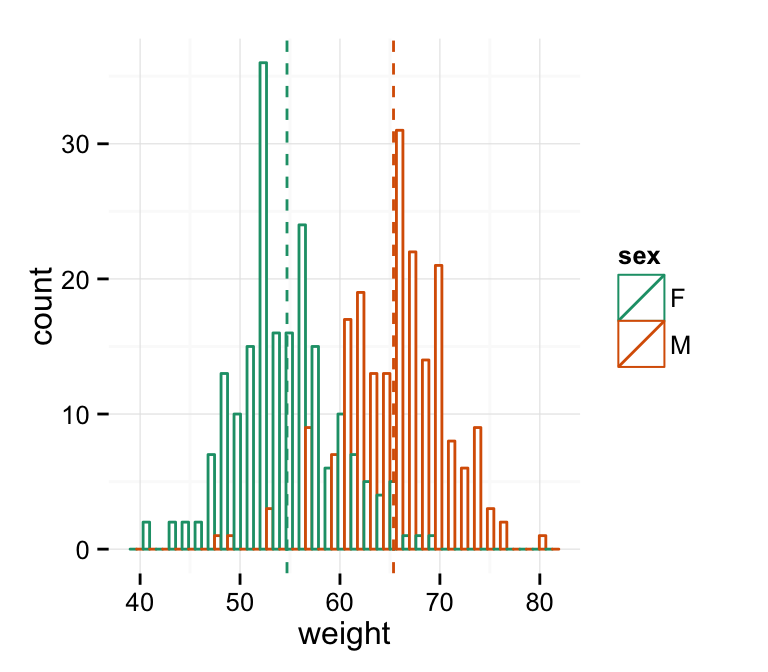
Related Book:
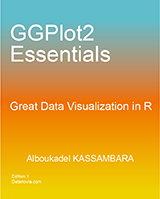
GGPlot2 Essentials for Great Data Visualization in R
Prepare the data
The data below will be used :
set.seed(1234)
df <- data.frame(
sex=factor(rep(c("F", "M"), each=200)),
weight=round(c(rnorm(200, mean=55, sd=5), rnorm(200, mean=65, sd=5)))
)
head(df)## sex weight
## 1 F 49
## 2 F 56
## 3 F 60
## 4 F 43
## 5 F 57
## 6 F 58Basic histogram plots
library(ggplot2)
# Basic histogram
ggplot(df, aes(x=weight)) + geom_histogram()
# Change the width of bins
ggplot(df, aes(x=weight)) +
geom_histogram(binwidth=1)
# Change colors
p<-ggplot(df, aes(x=weight)) +
geom_histogram(color="black", fill="white")
p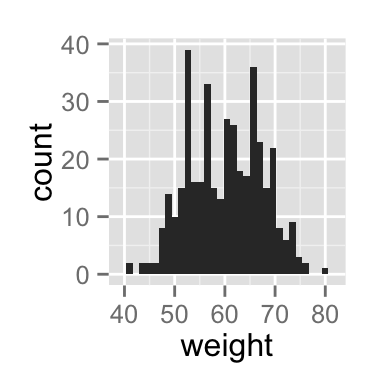
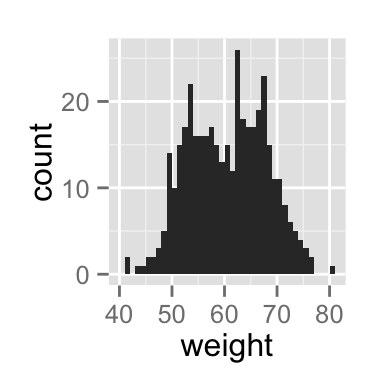
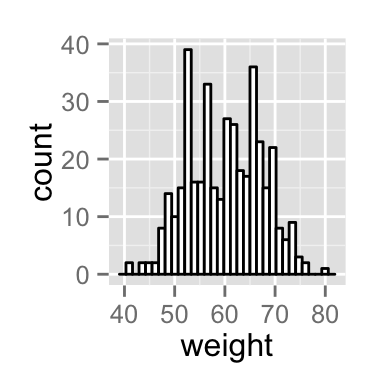
Add mean line and density plot on the histogram
- The histogram is plotted with density instead of count on y-axis
- Overlay with transparent density plot. The value of alpha controls the level of transparency
# Add mean line
p+ geom_vline(aes(xintercept=mean(weight)),
color="blue", linetype="dashed", size=1)
# Histogram with density plot
ggplot(df, aes(x=weight)) +
geom_histogram(aes(y=..density..), colour="black", fill="white")+
geom_density(alpha=.2, fill="#FF6666") 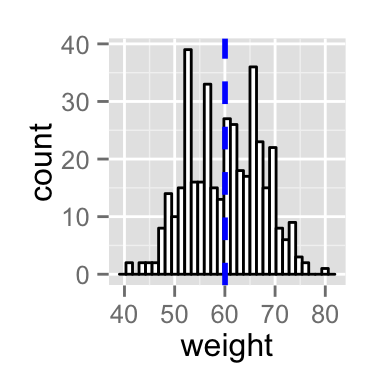
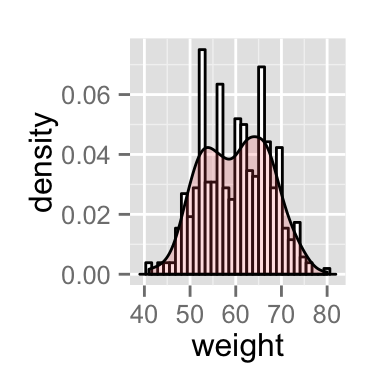
Read more on ggplot2 line types : ggplot2 line types
Change histogram plot line types and colors
# Change line color and fill color
ggplot(df, aes(x=weight))+
geom_histogram(color="darkblue", fill="lightblue")
# Change line type
ggplot(df, aes(x=weight))+
geom_histogram(color="black", fill="lightblue",
linetype="dashed")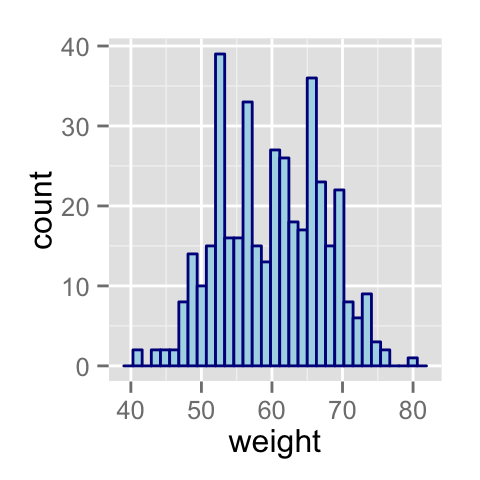
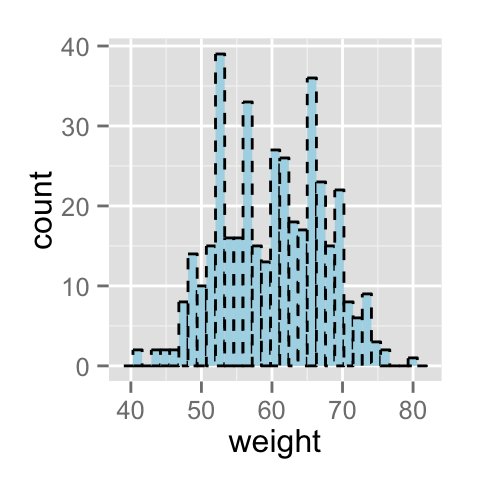
Change histogram plot colors by groups
Calculate the mean of each group :
The package plyr is used to calculate the average weight of each group :
library(plyr)
mu <- ddply(df, "sex", summarise, grp.mean=mean(weight))
head(mu)## sex grp.mean
## 1 F 54.70
## 2 M 65.36Change line colors
Histogram plot line colors can be automatically controlled by the levels of the variable sex.
Note that, you can change the position adjustment to use for overlapping points on the layer. Possible values for the argument position are “identity”, “stack”, “dodge”. Default value is “stack”.
# Change histogram plot line colors by groups
ggplot(df, aes(x=weight, color=sex)) +
geom_histogram(fill="white")
# Overlaid histograms
ggplot(df, aes(x=weight, color=sex)) +
geom_histogram(fill="white", alpha=0.5, position="identity")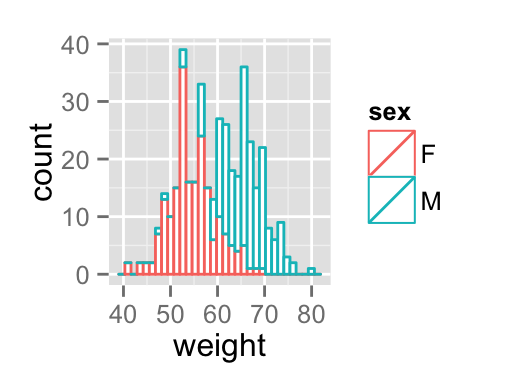
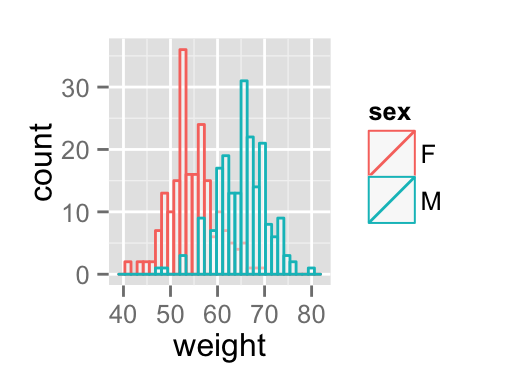
# Interleaved histograms
ggplot(df, aes(x=weight, color=sex)) +
geom_histogram(fill="white", position="dodge")+
theme(legend.position="top")
# Add mean lines
p<-ggplot(df, aes(x=weight, color=sex)) +
geom_histogram(fill="white", position="dodge")+
geom_vline(data=mu, aes(xintercept=grp.mean, color=sex),
linetype="dashed")+
theme(legend.position="top")
p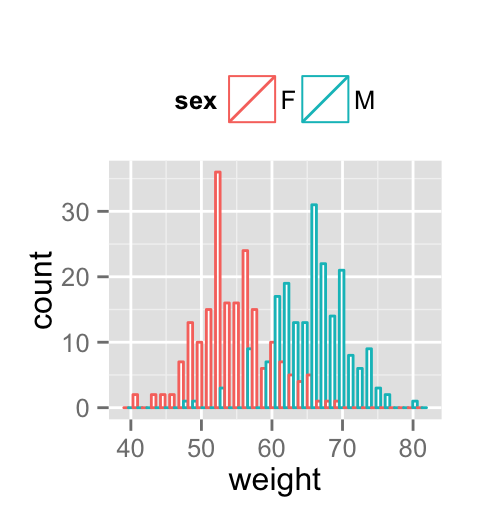
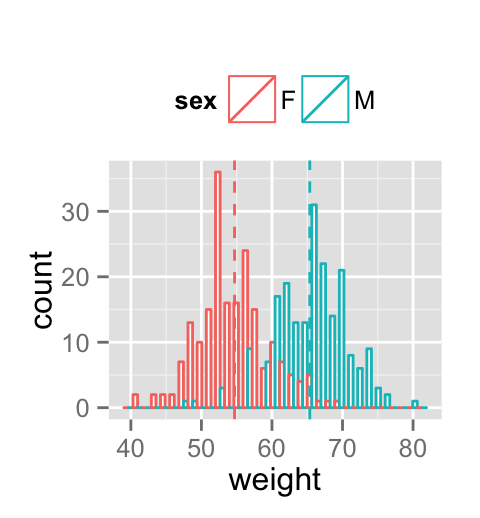
It is also possible to change manually histogram plot line colors using the functions :
- scale_color_manual() : to use custom colors
- scale_color_brewer() : to use color palettes from RColorBrewer package
- scale_color_grey() : to use grey color palettes
# Use custom color palettes
p+scale_color_manual(values=c("#999999", "#E69F00", "#56B4E9"))
# Use brewer color palettes
p+scale_color_brewer(palette="Dark2")
# Use grey scale
p + scale_color_grey() + theme_classic() +
theme(legend.position="top")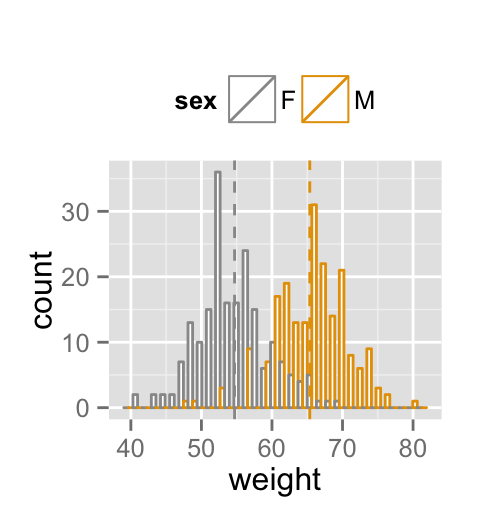
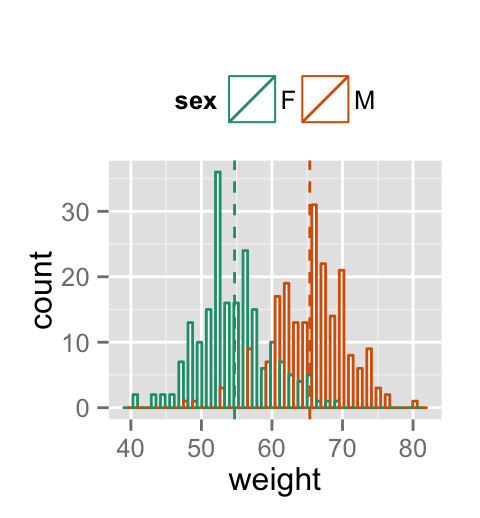
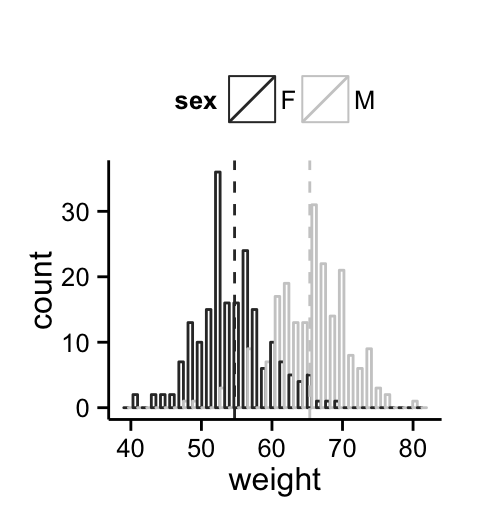
Read more on ggplot2 colors here : ggplot2 colors
Change fill colors
Histogram plot fill colors can be automatically controlled by the levels of sex :
# Change histogram plot fill colors by groups
ggplot(df, aes(x=weight, fill=sex, color=sex)) +
geom_histogram(position="identity")
# Use semi-transparent fill
p<-ggplot(df, aes(x=weight, fill=sex, color=sex)) +
geom_histogram(position="identity", alpha=0.5)
p
# Add mean lines
p+geom_vline(data=mu, aes(xintercept=grp.mean, color=sex),
linetype="dashed")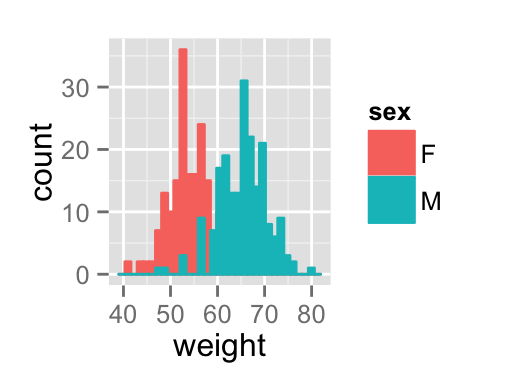
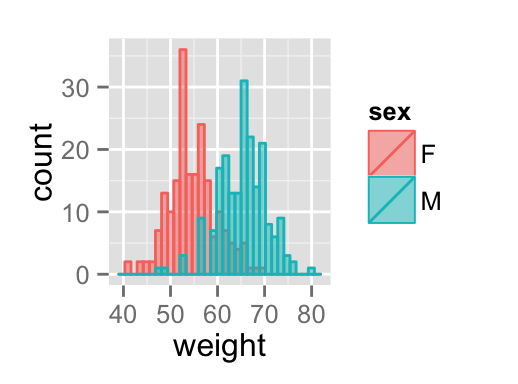
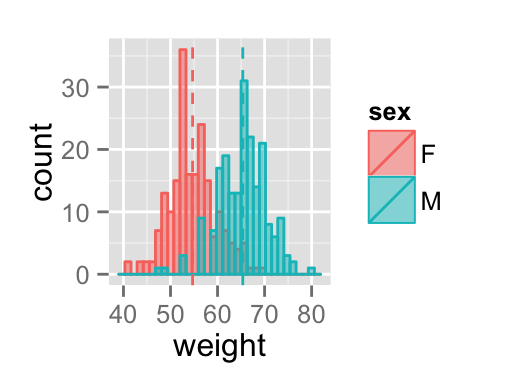
It is also possible to change manually histogram plot fill colors using the functions :
- scale_fill_manual() : to use custom colors
- scale_fill_brewer() : to use color palettes from RColorBrewer package
- scale_fill_grey() : to use grey color palettes
# Use custom color palettes
p+scale_color_manual(values=c("#999999", "#E69F00", "#56B4E9"))+
scale_fill_manual(values=c("#999999", "#E69F00", "#56B4E9"))
# use brewer color palettes
p+scale_color_brewer(palette="Dark2")+
scale_fill_brewer(palette="Dark2")
# Use grey scale
p + scale_color_grey()+scale_fill_grey() +
theme_classic()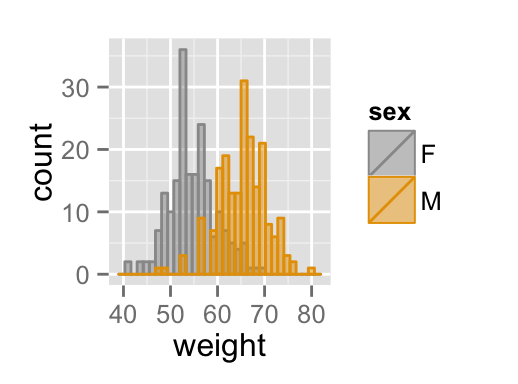
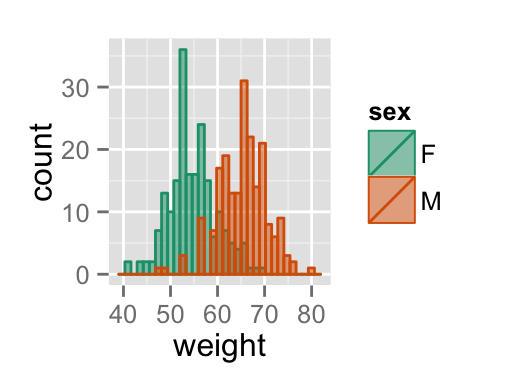
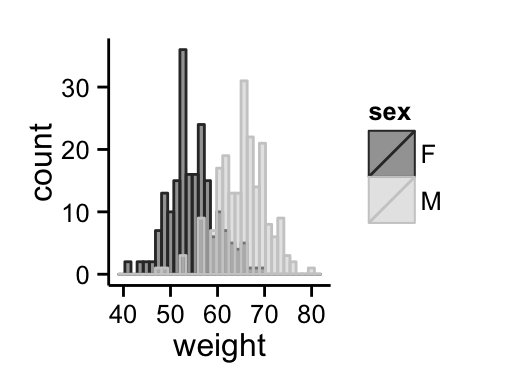
Read more on ggplot2 colors here : ggplot2 colors
Change the legend position
p + theme(legend.position="top")
p + theme(legend.position="bottom")
# Remove legend
p + theme(legend.position="none")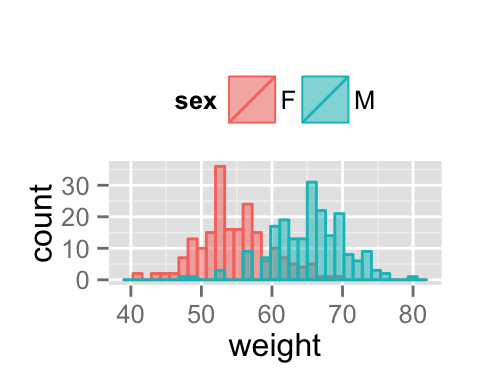
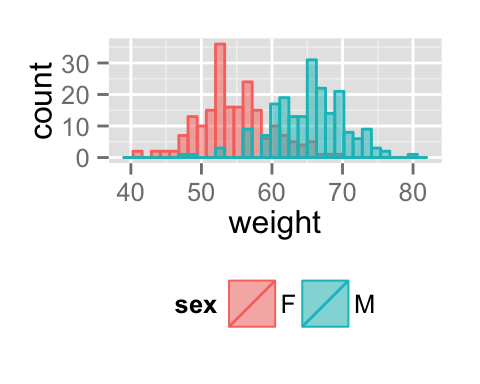
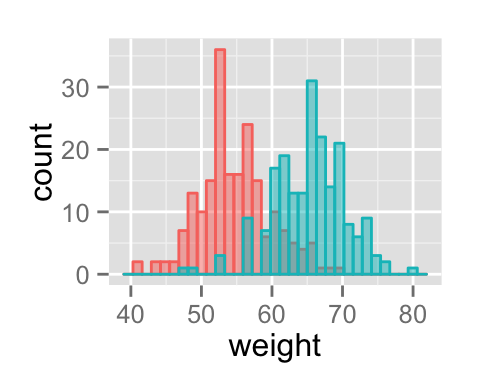
The allowed values for the arguments legend.position are : “left”,“top”, “right”, “bottom”.
Read more on ggplot legends : ggplot2 legends
Use facets
Split the plot into multiple panels :
p<-ggplot(df, aes(x=weight))+
geom_histogram(color="black", fill="white")+
facet_grid(sex ~ .)
p
# Add mean lines
p+geom_vline(data=mu, aes(xintercept=grp.mean, color="red"),
linetype="dashed")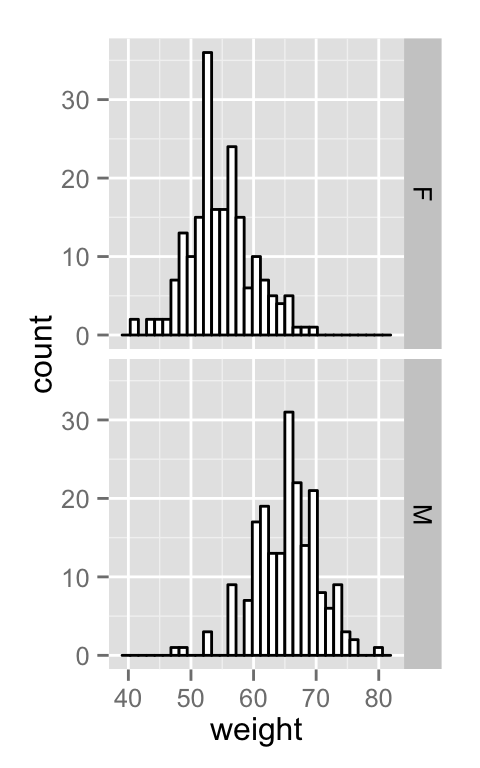
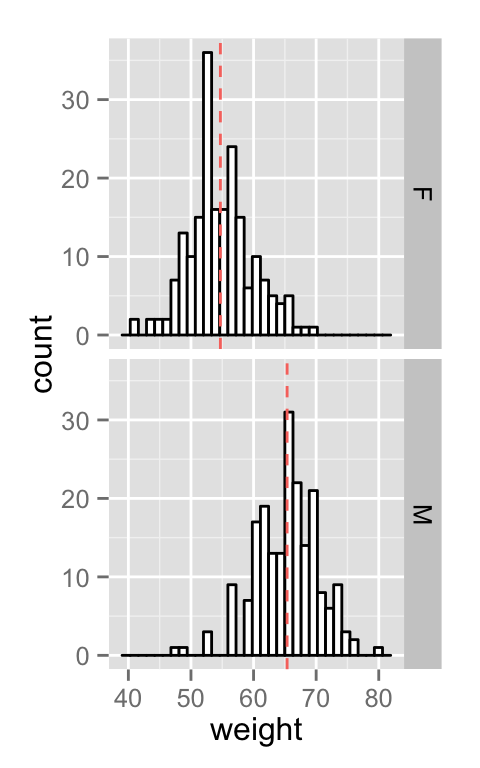
Read more on facets : ggplot2 facets
Customized histogram plots
# Basic histogram
ggplot(df, aes(x=weight, fill=sex)) +
geom_histogram(fill="white", color="black")+
geom_vline(aes(xintercept=mean(weight)), color="blue",
linetype="dashed")+
labs(title="Weight histogram plot",x="Weight(kg)", y = "Count")+
theme_classic()
# Change line colors by groups
ggplot(df, aes(x=weight, color=sex, fill=sex)) +
geom_histogram(position="identity", alpha=0.5)+
geom_vline(data=mu, aes(xintercept=grp.mean, color=sex),
linetype="dashed")+
scale_color_manual(values=c("#999999", "#E69F00", "#56B4E9"))+
scale_fill_manual(values=c("#999999", "#E69F00", "#56B4E9"))+
labs(title="Weight histogram plot",x="Weight(kg)", y = "Count")+
theme_classic()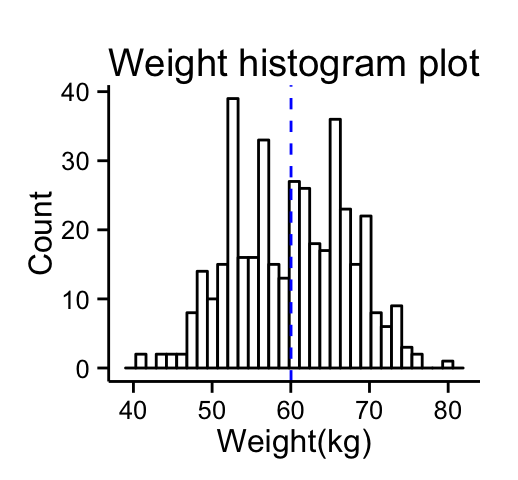
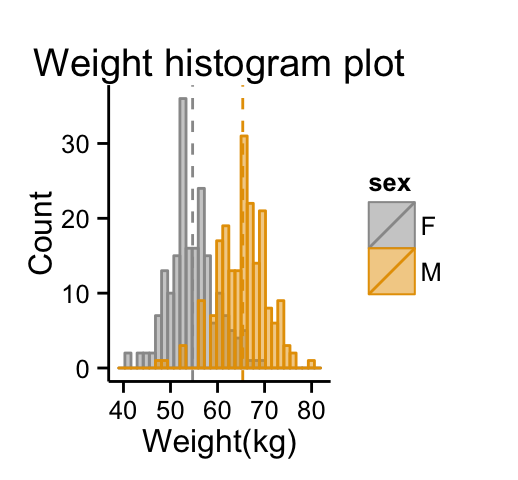
Combine histogram and density plots :
# Change line colors by groups
ggplot(df, aes(x=weight, color=sex, fill=sex)) +
geom_histogram(aes(y=..density..), position="identity", alpha=0.5)+
geom_density(alpha=0.6)+
geom_vline(data=mu, aes(xintercept=grp.mean, color=sex),
linetype="dashed")+
scale_color_manual(values=c("#999999", "#E69F00", "#56B4E9"))+
scale_fill_manual(values=c("#999999", "#E69F00", "#56B4E9"))+
labs(title="Weight histogram plot",x="Weight(kg)", y = "Density")+
theme_classic()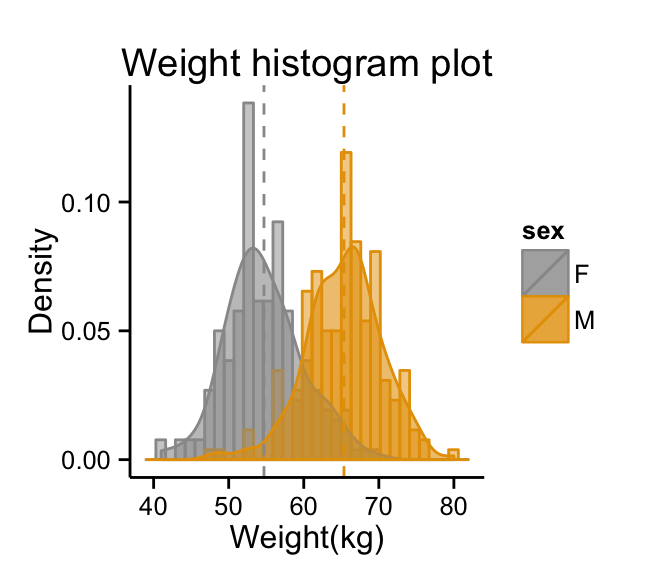
Change line colors manually :
p<-ggplot(df, aes(x=weight, color=sex)) +
geom_histogram(fill="white", position="dodge")+
geom_vline(data=mu, aes(xintercept=grp.mean, color=sex),
linetype="dashed")
# Continuous colors
p + scale_color_brewer(palette="Paired") +
theme_classic()+theme(legend.position="top")
# Discrete colors
p + scale_color_brewer(palette="Dark2") +
theme_minimal()+theme_classic()+theme(legend.position="top")
# Gradient colors
p + scale_color_brewer(palette="Accent") +
theme_minimal()+theme(legend.position="top")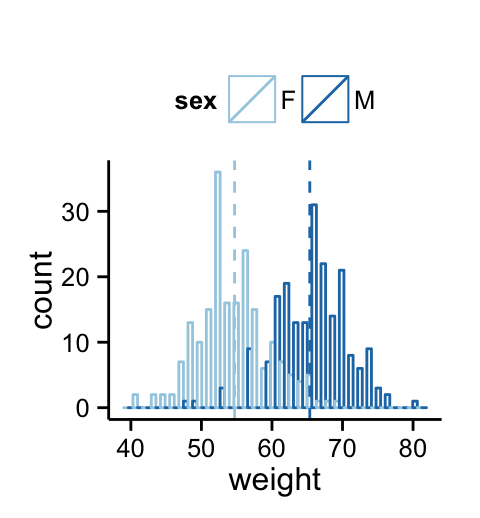
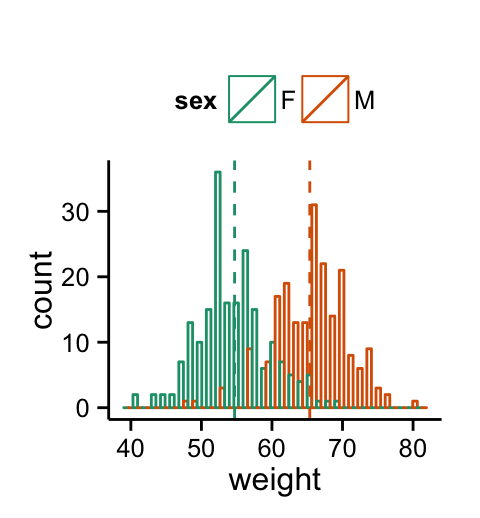
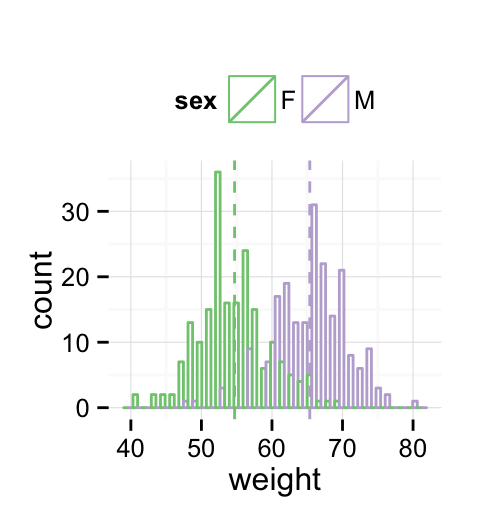
Read more on ggplot2 colors here : ggplot2 colors
Infos
This analysis has been performed using R software (ver. 3.1.2) and ggplot2 (ver. 1.0.0)
Show me some love with the like buttons below... Thank you and please don't forget to share and comment below!!
Montrez-moi un peu d'amour avec les like ci-dessous ... Merci et n'oubliez pas, s'il vous plaît, de partager et de commenter ci-dessous!
Recommended for You!
Recommended for you
This section contains best data science and self-development resources to help you on your path.
Coursera - Online Courses and Specialization
Data science
- Course: Machine Learning: Master the Fundamentals by Standford
- Specialization: Data Science by Johns Hopkins University
- Specialization: Python for Everybody by University of Michigan
- Courses: Build Skills for a Top Job in any Industry by Coursera
- Specialization: Master Machine Learning Fundamentals by University of Washington
- Specialization: Statistics with R by Duke University
- Specialization: Software Development in R by Johns Hopkins University
- Specialization: Genomic Data Science by Johns Hopkins University
Popular Courses Launched in 2020
- Google IT Automation with Python by Google
- AI for Medicine by deeplearning.ai
- Epidemiology in Public Health Practice by Johns Hopkins University
- AWS Fundamentals by Amazon Web Services
Trending Courses
- The Science of Well-Being by Yale University
- Google IT Support Professional by Google
- Python for Everybody by University of Michigan
- IBM Data Science Professional Certificate by IBM
- Business Foundations by University of Pennsylvania
- Introduction to Psychology by Yale University
- Excel Skills for Business by Macquarie University
- Psychological First Aid by Johns Hopkins University
- Graphic Design by Cal Arts
Books - Data Science
Our Books
- Practical Guide to Cluster Analysis in R by A. Kassambara (Datanovia)
- Practical Guide To Principal Component Methods in R by A. Kassambara (Datanovia)
- Machine Learning Essentials: Practical Guide in R by A. Kassambara (Datanovia)
- R Graphics Essentials for Great Data Visualization by A. Kassambara (Datanovia)
- GGPlot2 Essentials for Great Data Visualization in R by A. Kassambara (Datanovia)
- Network Analysis and Visualization in R by A. Kassambara (Datanovia)
- Practical Statistics in R for Comparing Groups: Numerical Variables by A. Kassambara (Datanovia)
- Inter-Rater Reliability Essentials: Practical Guide in R by A. Kassambara (Datanovia)
Others
- R for Data Science: Import, Tidy, Transform, Visualize, and Model Data by Hadley Wickham & Garrett Grolemund
- Hands-On Machine Learning with Scikit-Learn, Keras, and TensorFlow: Concepts, Tools, and Techniques to Build Intelligent Systems by Aurelien Géron
- Practical Statistics for Data Scientists: 50 Essential Concepts by Peter Bruce & Andrew Bruce
- Hands-On Programming with R: Write Your Own Functions And Simulations by Garrett Grolemund & Hadley Wickham
- An Introduction to Statistical Learning: with Applications in R by Gareth James et al.
- Deep Learning with R by François Chollet & J.J. Allaire
- Deep Learning with Python by François Chollet







